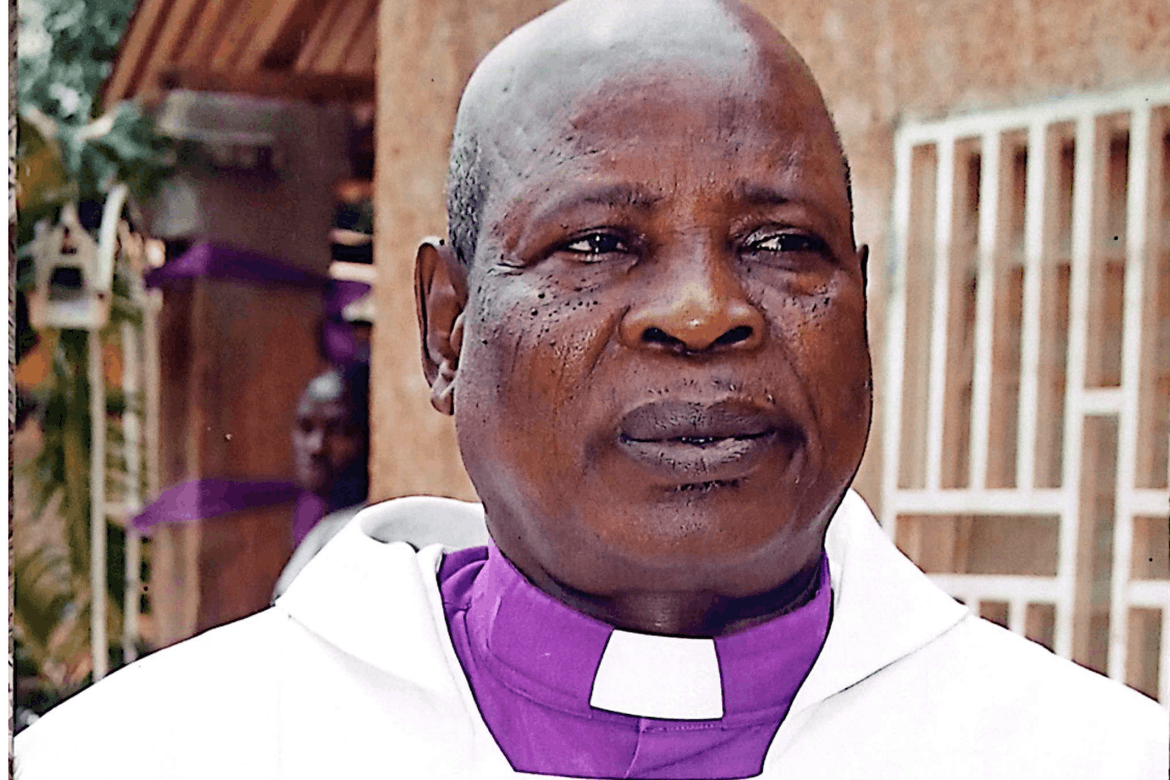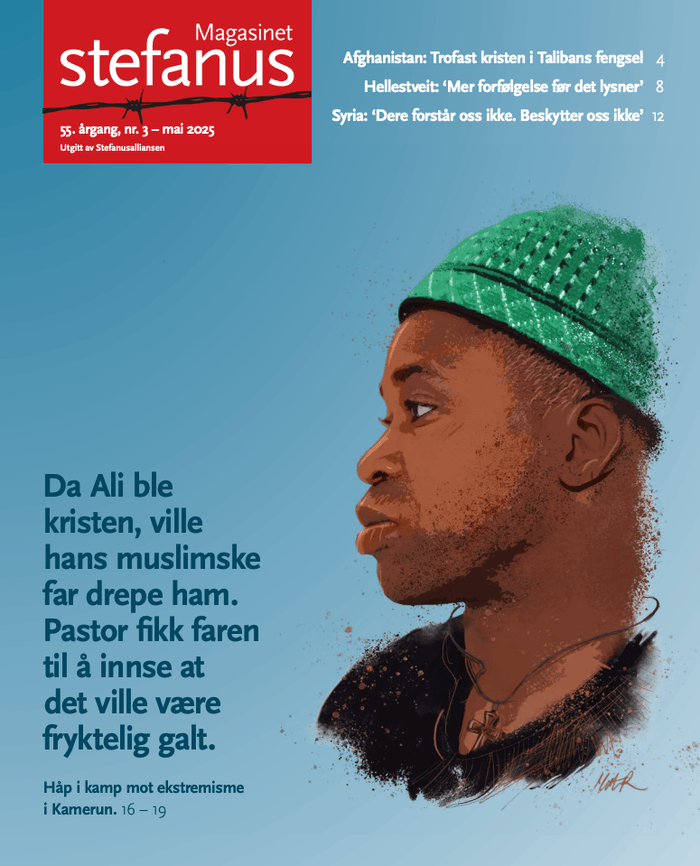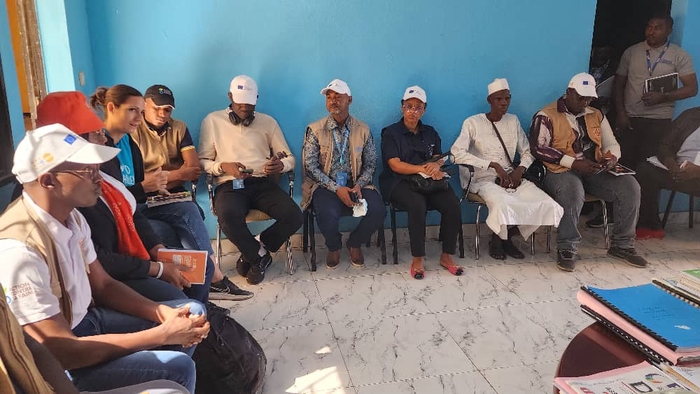Father Wanted to Kill Son Who Became a Christian. Pastor Talked Him Out of It.
Pastor Robert Goyek had a difficult conversation with a Muslim father who intended to kill his son after the son converted to Christianity.

Pastor Robert Goyek had a difficult conversation with a Muslim father who intended to kill his son after the son converted to Christianity.
Interview by Johannes Morken, first published in the Stefanus Alliance Magazine
Pastor Robert Goyek had a difficult conversation with a Muslim father who intended to kill his son after the son converted to Christianity. The father was determined to take his son’s life, but Pastor Robert Goyek convinced him that doing so would be wrong.
Pastor Robert Goyek serves as the chairman of PROCMURA, an organisation supported by Stefanus Alliance. In northern Cameroon, he has encountered both terrorism and the radicalisation of ordinary people influenced by extremist interpretations of Islam. He regularly engages in challenging conversations to confront and counter religious hatred.
The pastor shared a story from Cameroon that illustrates the depth of these challenges. A young Muslim man, Ali, came into contact with Christian youth from the Fraternal Lutheran Church in a neighbouring town. He listened to several of the pastor’s sermons. After deep reflection, Ali made a decision: he wanted to become a Christian. When his father learned that his son had become a Christian, he urged Ali to return to Islam. But Ali replied: ‘I have listened to the message of Jesus the Messiah. I am convinced and have made my choice. I cannot return to the Islamic faith.’
His Life Was in Danger
The father became enraged and beat his son so severely that the young man’s life was in danger. He shouted, “You are no longer our son. You have lost all rights in this family. Wherever we find you, know that you will be killed because you are an infidel.”
Fearing for his life, the young man fled to a village far from his family.Pastor Robert Goyek went to meet Ali, who confirmed that he still wanted to remain a Christian despite the threats. To protect him, the pastor took Ali into his care.
Ali continues to live out his Christian faith within the church community. He is relatively safe for now, but no one knows what the future may hold.
“One day I met Ali’s father and some others from the Muslim community. I spoke at length with them, especially with the father. I explained the importance of freedom of religion—the right to choose one’s faith. I pointed out that the Prophet Muhammad recognised Isa al-Masih, Jesus, as a prophet of the Most High God. I told him: ‘If you kill your son, you are committing a crime and will be imprisoned!’”
After many conversations, the father made his decision: he would neither harm nor kill the young man.
“Threats Because We Do Not Know”
After many conversations, the father made his decision: they would not harm or kill the young man. However, he asked Ali not to return home.
The father said to me, “Pastor, we make these threats because we do not know. We cannot read the Qur’an, and besides, it is in Arabic. In the midst of an environment of radicalisation and Islamic ideology from fanatical religious teachers from Saudi Arabia, we are ready to kill anyone who leaves the Islamic faith.”
The father thanked me for an honest and constructive conversation about Muslim-Christian relations.

Ali chose the Christian faith. His father wanted to kill him. Illustration from Magasinet Stefanus: Morten Ravnbø, based on a photo from Shutterstock.
A Lifelong Struggle
For Pastor Robert Goyek, this is part of a lifelong struggle against hatred and Islamist terror. He remembers a time when Muslims and Christians lived peacefully side by side in the village where he grew up.
“Hatred and violence lead to fear, destruction, and death. Respect and human dignity must be at the centre—no matter who we are,” says Pastor Robert Goyek to Magasinet Stefanus.
He lives in Garoua, the regional capital in northern Cameroon, not far from Nigeria to the west and Chad to the east. In 2013, the Islamist terror group Boko Haram, already spreading fear and death in Nigeria for five years, began launching horrific attacks in northern Cameroon and Chad as well.
“The threats and attacks are becoming increasingly devious and aggressive.”
— Robert Goyek
Peaceful Coexistence
Robert Goyek has dedicated his entire adult life to promoting peaceful coexistence. He shared his story in a digital interview—he was in Garoua, and I was in Oslo.
In northern Cameroon, the church-based organisation Prica-Cameroon, where Goyek serves as president, carries out extensive peacebuilding work between Muslims and Christians. At the same time, he chairs PROCMURA, an organisation supported by Stefanus Alliance, which works toward the same goal across many African countries.
Goyek, now 69, grew up in a poor village in northern Cameroon. There was no system for registering births, so when he attended primary school from 1963 to 1969, the headmaster issued birth certificates. His states that he was born “around 1956.”
His father was illiterate, and at that time, there was no school in the village. Most of the people were animists, while some were Christians and others Muslims.
"Back then, it was not unusual for children in the same family to choose different faiths—some became Muslims, others Christians. But everyone lived in mutual respect, without conflict over religion. I grew up in this religious diversity," he says.
Became a Christian
Robert Goyek converted to the Christian faith as a result of the work of a Norwegian missionary sent out by Lutheran Brethren International Mission in 1932. A Lutheran church was established for the Musgum communities in Cameroon and Chad. Robert became active in the church, including in a choir, and was baptised in 1970.
"I appreciated the programme ‘Approach to Islam’ that the missionaries had developed to promote peaceful coexistence," he says.
Robert knew early on that he wanted to become a pastor and work with dialogue and coexistence.
"At that time, Islam in our region was moderate and tolerant. It created a climate of mutual respect between Christians and Muslims. This has shaped my journey and my life’s calling."
"Many young people are exposed to sexual violence, forced marriage, and forced conversion."
— Robert Goyek

Local Peace Committee at Work. Photo: Prica Cameroon
When Terror Came
From 2009, Boko Haram’s terror had taken bloody root in the northern regions of Nigeria. Twelve years ago, the violence also reached Cameroon. Boko Haram has attacked military forces and villages, bombed markets, churches, and mosques, leaving behind fear and death.
"Many children have been orphaned. Many lose access to education. Entire communities are collapsing both socially and economically," says Goyek, and adds:
"What is especially alarming is that schoolchildren—both girls and boys—are being kidnapped and abducted. Many end up in slavery, subjected to sexual violence, forced marriage, and forced conversion."
Many Nigerians have fled to Cameroon. Churches are mobilising to help. Goyek speaks of desperate cries for help from Christians in both Nigeria and Cameroon. They are calling on Christians outside the region, and on the international community, to intervene to secure basic human rights and peace.
"The situation is getting worse. The threats and attacks are becoming increasingly devious and aggressive. The escalation is partly due to extremist groups succeeding in recruiting children as soldiers. The children are indoctrinated and radicalised with extremist ideology. Violence is justified with promises of heavenly reward," Goyek explains.
A Lifelong Calling
During the interview, Goyek reports yet another attack, this time in Chari, in the far north. More than 20 soldiers were killed by Boko Haram. They had been stationed to guard against jihadist assaults. Boko Haram strikes this area regularly and with extreme violence. In this region, his organisation, Prica-Cameroon, has for several years maintained a local peace committee.
Robert Goyek says he carries a lifelong calling.
"Threats, terrorist attacks, and violence are damaging the entire Sahel region, especially Cameroon, Nigeria, and Chad. I want to see communities flourish, not be destroyed by hatred, violence, and death. People must live in peace across religious, ethnic, and social divides."
Inspired by the Words of Jesus
– Where do you find your motivation?
– I draw strength and inspiration from Matthew 5:9: “Blessed are the peacemakers, for they shall be called children of God.” Romans 12:18 also teaches us: “If it is possible, as far as it depends on you, live at peace with everyone.”
I find strength in the words of Jesus: “Blessed are the peacemakers, for they shall be called children of God.”
– Do you have examples of positive results?
– We have peace committees in every district where extremist attacks occur. For 12 years we have raised awareness about the importance of peaceful relations between people of different faiths. The limited funds we and others have received from Europe have been well used. We urge European governments to increase aid in proportion to the scale of violence—and to also support Christian organisations like ours in Prica-Cameroon. We carry out vital peace work right in the areas affected by terror.
– What can Christians and churches do?
– They can support us practically, financially, morally, and spiritually. They can share information, for example by connecting with us. The work for religious coexistence, tolerance, and respect for human dignity is critically important in Africa. We must confront the extremism that is tearing communities apart.